- Home
- Ian Mcewan
Machines Like Me Page 3
Machines Like Me Read online
Page 3
Before lunch I’d sent Miranda an email inviting her to dinner that night. Now she’d accepted. She liked my cooking. During the meal I would make a proposal. I would fill in roughly half the choices for Adam’s personality, then give her the link and the password and let her choose the rest. I wouldn’t interfere, I wouldn’t even want to know what decisions she had made. She might be influenced by a version of herself: delightful. She might conjure the man of her dreams: instructive. Adam would come into our lives like a real person, with the layered intricacies of his personality revealed only through time, through events, through his dealings with whomever he met. In a sense he would be like our child. What we were separately would be merged in him. Miranda would be drawn into the adventure. We would be partners, and Adam would be our joint concern, our creation. We would be a family. There was nothing underhand in my plan. I was sure to see more of her. We’d have fun.
My schemes generally fell apart. This was different. I was clear-headed, incapable of deceiving myself. Adam was not my love-rival. However he fascinated her, she was also physically repelled by him. She had told me as much. It was ‘creepy’ she had told me the day before, that his body was warm. She said it was ‘a bit weird’ that he could make words with his tongue. But he had a word-store as large as Shakespeare’s. It was his mind that aroused her curiosity.
So the decision not to sell Adam was made. I was to share him with Miranda – just as I might have shared a house. He would contain us. Making progress, comparing notes, pooling disappointments. I regarded myself at thirty-two as an old hand at love. Earnest declarations would drive her away. Far better to make this journey together. Already she was my friend, she sometimes held my hand. I wasn’t starting from nowhere. Deeper feelings could steal up on her, as they had on me. If they didn’t, then at least I’d have the consolation of more time with her.
In my ancient fridge, whose rusty door handle had partly come away, was a corn-fed chicken, a quarter-pound of butter, two lemons and a bunch of fresh tarragon. In a bowl on the side were a few bulbs of garlic. In a cupboard, some earth-caked potatoes, already sprouting – but peeled, they would roast nicely. Lettuce, a dressing, a hearty bottle of Cahors. Simple. First, heat the oven. These ordinary matters filled my thoughts as I stood from my desk. An old friend of mine, a journalist, once said that paradise on earth was to work all day alone in anticipation of an evening in interesting company.
The meal I intended to cook for her and the homely dictum of my friend distracted me and for the moment Adam was not on my mind. So it was a shock to enter the kitchen and find him standing there, naked, by the table, partly facing away from me, one hand vaguely fiddling with the wire that protruded from his umbilicus. His other hand was somewhere near his chin, stroking it in a contemplative way – a clever algorithm no doubt, but entirely convincing in its projection of a thoughtful self.
I recovered and said, ‘Adam?’
He turned towards me slowly. When he was facing me full on, he met my gaze and blinked, and blinked again. The mechanism was working but seemed too deliberate.
He said, ‘Charlie, I’m pleased to meet you at last. Could you bear to arrange my downloads and prepare the various parameters …’
He paused, looking at me intently, his black-flecked eyes scanning my face in quick saccades. Taking me in. ‘You’ll find all you need to know in the manual.’
‘I’ll do that,’ I said. ‘In my own time.’
His voice surprised and pleased me. It was a light tenor, at a decent speed, with a kindly variation in tone, both obliging and friendly, but no hint of subservience. The accent was the standard English of an educated man from the middle-class south, with the faintest hint of West Country vowels. My heart was beating fast, but I was intent on seeming calm. To show that I was, I made myself take a step closer. We stared at each other in silence.
Years before, as a student, I read of a ‘first contact’ in 1924 between an explorer called Leahy and some highlanders of Papua New Guinea. The tribesmen could not tell whether the pale figures who had suddenly appeared on their land were humans or spirits. They returned to their village to discuss the matter, leaving a teenage boy behind to spy from a distance. The question was settled when he reported back that one of Leahy’s colleagues had gone behind a bush to defecate. Here, in my kitchen in 1982, not many years later, things were not so simple. The manual informed me that Adam had an operating system, as well as a nature – that is, a human nature – and a personality, the one I hoped Miranda would help provide. I was unsure how these three substrates overlapped or reacted with each other. When I studied anthropology, a universal human nature was thought not to exist. It was a romantic illusion, merely the variable product of local conditions. Only anthropologists, who studied other cultures in depth, who knew the beautiful extent of human variety, fully grasped the absurdity of human universals. People who stayed behind at home in comfort understood nothing, not even of their own cultures. One of my teachers liked to quote Kipling – ‘And what should they know of England who only England know?’
By the time I was in my mid-twenties, evolutionary psychology was beginning to reassert the idea of an essential nature, derived from a common genetic inheritance, independent of time and place. The response from the mainstream of social studies was dismissive, sometimes furious. To speak of genes in relation to people’s behaviour evoked memories of Hitler’s Third Reich. Fashions change. But Adam’s makers were riding the new wave of evolutionary thinking.
He stood before me, perfectly still in the gloom of the winter’s afternoon. The debris of the packaging that had protected him was still piled around his feet. He emerged from it like Botticelli’s Venus rising from her shell. Through the north-facing window, the diminishing light picked out the outlines of just one half of his form, one side of his noble face. The only sounds were the friendly murmur of the fridge and a muted drone of traffic. I had a sense then of his loneliness, settling like a weight around his muscular shoulders. He had woken to find himself in a dingy kitchen, in London SW9 in the late twentieth century, without friends, without a past or any sense of his future. He truly was alone. All the other Adams and Eves were spread about the world with their owners, though seven Eves were said to be concentrated in Riyadh.
As I reached for the light switch I said, ‘How are you feeling?’
He looked away to consider his reply. ‘I don’t feel right.’
This time his tone was flat. It seemed my question had lowered his spirits. But within such microprocessors, what spirits?
‘What’s wrong?’
‘I don’t have any clothes. And—’
‘I’ll get you some. What else?’
‘This wire. If I pull it out it will hurt.’
‘I’ll do it and it won’t hurt.’
But I didn’t move immediately. In full electric light I was able to observe his expression, which barely shifted when he spoke. It was not an artificial face I saw, but the mask of a poker player. Without the lifeblood of a personality, he had little to express. He was running on some form of default program that would serve him until the downloads were complete. He had movements, phrases, routines that gave him a veneer of plausibility. Minimally, he knew what to do, but little else. Like a man with a shocking hangover.
I could admit it to myself now – I was fearful of him and reluctant to go closer. Also, I was absorbing the implications of his last word. Adam only had to behave as though he felt pain and I would be obliged to believe him, respond to him as if he did. Too difficult not to. Too starkly pitched against the drift of human sympathies. At the same time I couldn’t believe he was capable of being hurt, or of having feelings, or of any sentience at all. And yet I had asked him how he felt. His reply had been appropriate, and so too my offer to bring him clothes. And I believed none of it. I was playing a computer game. But a real game, as real as social life, the proof of which was my heart’s refusal to settle and the dryness in my mouth.
It was clea
r he would speak only when spoken to. Resisting the impulse to reassure him further, I went back into the bedroom and found him some clothes. He was a sturdy fellow, a couple of inches shorter than me, but I thought my stuff would fit him well enough. Trainers, socks, underwear, jeans and sweater. I stood in front of him and put the bundle into his hands. I wanted to watch him dress to see if his motor functions were as good as the literature had promised. Any three-year-old knows how hard it is to put socks on.
When I gave him my clothes I caught a faint scent from his upper torso and perhaps his legs too, of warmed oil, the pale, highly refined sort my father had used to lubricate the keys of his sax. Adam held the clothes in the crook of both arms, with his hands extended towards me. He didn’t flinch when I stooped and disengaged the power line. His tight, chiselled features showed nothing at all. A forklift truck approaching a pallet would have been as expressive. Then, I supposed, some logic gate or a network of them yielded and he whispered, ‘Thank you.’ These words were accompanied by an emphatic nod of the head. He sat down, rested the pile on the table, then took from the top the sweater. After a reflective pause he unfolded it, laid it flat, chest side down, threaded his right hand and arm through to the shoulder, then the left, and with a complicated muscular swaying shrug it was on him and he was tugging it down straight at the waist. The sweater, made of faded yellow fleece, bore in red letters the jokey slogan of a charity I once supported. ‘Dyslexics of the World Untie!’ He unboxed the socks and remained seated to pull them on. His movements were deft. No trace of hesitation, no problems with relative spatial calculation. He stood, held the boxer shorts low, stepped into them, pulled them up, stepped likewise into the jeans, zipped up the fly and secured the silver button at the waist in one continuous movement. He sat again, hooked his feet into the trainers and tied the laces in a double bow at a blurring speed that to some might have seemed inhuman. But I didn’t think it was. It was a triumph of engineering and software design: a celebration of human ingenuity.
I turned away from him to begin my preparations for dinner. Overhead, I heard Miranda cross the room, her steps muffled, as though barefoot. Preparing to take a shower, getting ready. For me. I pictured her still wet, in a dressing gown, opening her underwear drawer and wondering. Silk, yes. Peach? Fine. While the oven warmed, I set the ingredients out on the work surface. After a day of greedy trading, there’s nothing like cooking to bring one back into the world’s better side, its long history of catering to others. I looked over my shoulder. It was startling, the effect of the clothes. He sat there, elbows on the table like some old pal of mine, waiting for me to pour the first glass of the evening.
I called out to him, ‘I’m roasting a chicken with butter and tarragon.’ It was mischievous of me, knowing his plain diet of electrons.
Without pausing, and in the flattest of tones, he said, ‘They go well together. But it’s easy to burn the leaves when you’re browning the bird.’
Browning the bird? It was correct, I guessed, but it sounded odd.
‘What d’you advise?’
‘Cover the chicken with tinfoil. From the size of it I’d say seventy minutes at 180. Then brush the leaves off into the juice while you brown at the same temperature for fifteen minutes without the foil. Then pour the tarragon back on with the juices and melted butter.’
‘Thanks.’
‘Remember to let it stand under a cloth for ten minutes before you carve.’
‘I know about that.’
‘Sorry.’
Did I sound tetchy? By the early eighties we were long used to talking to machines, in our cars and homes, to call centres and health clinics. But Adam had weighed up my chicken from across the room and apologised for the extraneous advice. I glanced back at him again. Now I noticed that he’d pulled up the sleeves of the sweater to his elbows to expose powerful wrists. He’d interlaced his fingers and was resting his chin on his hands. And this was him without a personality. From where I stood, with the light picking out his high cheekbones, he looked tough, the quiet guy at the bar you’d prefer not to disturb. Not the sort to hand out cooking tips.
I felt the need, rather childish, to demonstrate that I was in charge. I said, ‘Adam, will you walk round the table a couple of times. I want to see how you move.’
‘Sure.’
There was nothing mechanical about his gait. In the confines of the room he managed a loping stride. When he’d been round twice he stood by his chair, waiting.
‘Now you could open the wine.’
‘Certainly.’
He came towards me with his open palm extended and I placed the corkscrew on it. It was of the articulated, cantilevering kind favoured by sommeliers. It gave him no trouble. He raised the cork to his nose, then reached into a cupboard for a glass, poured a half-inch and passed it to me. As I tasted it, his gaze on me was intent. The wine was hardly of the first or even second rank, but it wasn’t corked. I nodded and he filled the glass and set it down carefully by the stove. Then he returned to his chair as I turned away to prepare a salad.
A peaceful half-hour went by and neither of us spoke. I made a dressing for the salad and chopped the potatoes. Miranda was in my thoughts. I was convinced I’d reached one of those momentous points in life where the path into the future forked. Down one route, life would continue as before, down the other, it would be transformed. Love, adventures, sheer excitement, but also order in my new maturity, no more wild schemes, a home together, children. Or these last two were wild schemes. Hers was the sweetest nature, she was kind, beautiful, amusing, vastly intelligent …
At a sound behind me, I came back to myself, heard it again, and turned. Adam was still in his chair at the kitchen table. He had made, then repeated, the sound of a man purposefully clearing his throat.
‘Charlie, I understand that you’re cooking for your friend upstairs. Miranda.’
I said nothing.
‘According to my researches these past few seconds, and to my analysis, you should be careful of trusting her completely.’
‘What?’
‘According to my—’
‘Explain yourself.’
I was staring angrily into Adam’s blank face. He said in a quiet sorrowful voice, ‘There’s a possibility she’s a liar. A systematic, malicious liar.’
‘Meaning?’
‘It would take a moment, but she’s coming down the stairs.’
His hearing was better than mine. Within seconds there was a gentle tap at the door.
‘Would you like me to get it?’
I didn’t answer him. I was in such a fury. I went into the miniature hallway in the wrong frame of mind. Who or what was this idiot machine? Why should I tolerate it?
I wrenched the door open, and there she was in a pretty pale blue dress, smiling merrily at me, a posy of snowdrops in her hand, and she’d never looked so lovely.
TWO
Several weeks passed before Miranda was able to work on her share of Adam’s character. Her father was ill and she made frequent journeys to Salisbury to look after him. She had a paper to write on nineteenth-century Corn Law reform and its impact on a single street in a town in Herefordshire. The academic movement known generally as ‘theory’ had taken social history ‘by storm’ – her phrase. Since she had studied at a traditional university which offered old-fashioned narrative accounts of the past, she was having to take on a new vocabulary, a new way of thinking. Sometimes, as we lay side by side in bed (the evening of the tarragon chicken had been a success) I listened to her complaints and tried to look and sound sympathetic. It was no longer proper to assume that anything at all had ever happened in the past. There were only historical documents to consider, and changing scholarly approaches to them, and our own shifting relationship to those approaches, all of which were determined by ideological context, by relations to power and wealth, to race, class, gender and sexual orientation.
None of this seemed so unreasonable to me, or all that interesting. I didn’t
say so. I wanted to encourage Miranda in everything she did or thought. Love is generous. Besides, it suited me to think that whatever had once happened was no more than its evidence. In the new dispensation, the past weighed less. I was in the process of remaking myself and eager to forget my own recent history. My foolish choices were behind me. I saw a future with Miranda. I was approaching the shores of early middle age, and I was taking stock. I lived daily with the accumulated historical evidence my past had bequeathed, evidence I intended to obliterate: my loneliness, relative poverty, poor living quarters and diminished prospects. Where I stood in relation to the means of production and the rest was a blank to me. Nowhere, I preferred to think.
Was my purchase of Adam more proof of failure? I wasn’t sure. Waking in the small hours – next to Miranda, her place or mine – I summoned in the darkness a lever of the sort found by old railway tracks that would shunt Adam back to the store and return the money to my account. By daylight the matter was more diffuse or nuanced. I hadn’t told Miranda that Adam had spoken against her, and I hadn’t told Adam that Miranda was to have a hand in his personality – a punishment of sorts. I despised his warning about her, but his mind fascinated me – if a mind was what he had. His appearance was thuggishly handsome, he could put on his own socks and he was a technical miracle. He was expensive but this child of the Wiring Club could not let him go.
Working on the old computer in my bedroom, out of Adam’s sight, I typed in my own choices. I decided that answering every other question would be a sufficiently random kind of merging – our home-made genetic shuffling. Now I had a method and a partner, I relaxed into the process, which began to take on a vaguely erotic quality; we were making a child! Because Miranda was involved, I was protected from self-replication. The genetic metaphor was helpful. Scanning the lists of idiotic statements, I more or less chose approximations of myself. Whether Miranda did the same, or something different, we would end up with a third person, a new personality.

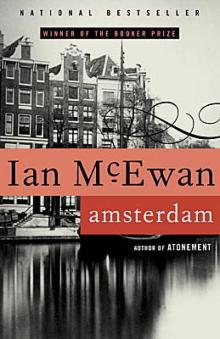 Amsterdam
Amsterdam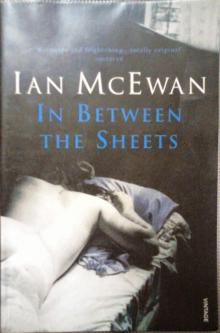 In Between the Sheets
In Between the Sheets Atonement
Atonement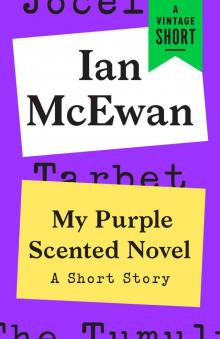 My Purple Scented Novel
My Purple Scented Novel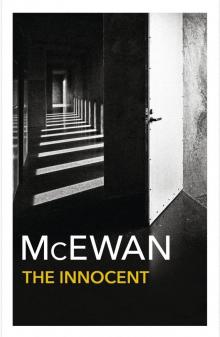 The Innocent
The Innocent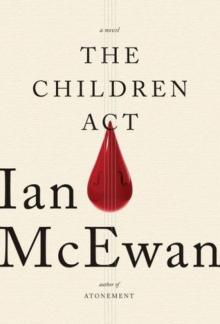 The Children Act
The Children Act Enduring Love
Enduring Love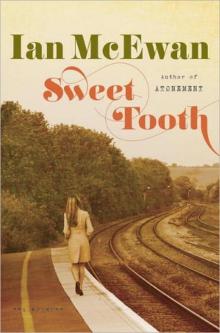 Sweet Tooth
Sweet Tooth On Chesil Beach
On Chesil Beach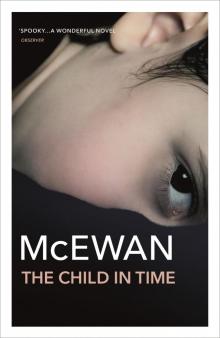 The Child in Time
The Child in Time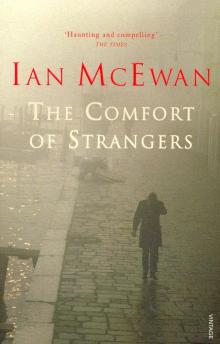 The Comfort of Strangers
The Comfort of Strangers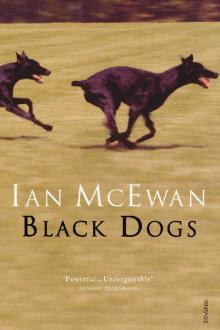 Black Dogs
Black Dogs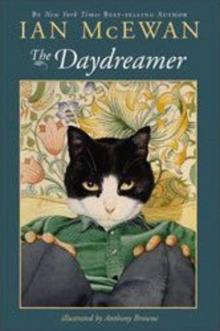 The Daydreamer
The Daydreamer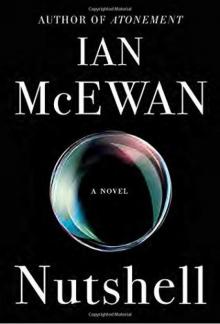 Nutshell
Nutshell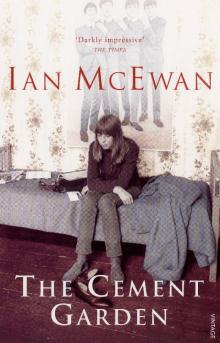 The Cement Garden
The Cement Garden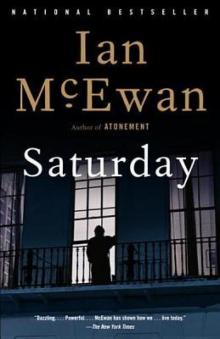 Saturday
Saturday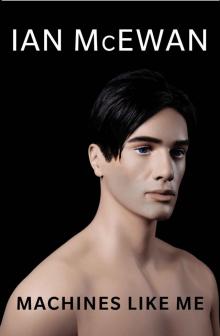 Machines Like Me
Machines Like Me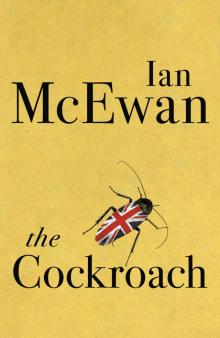 The Cockroach
The Cockroach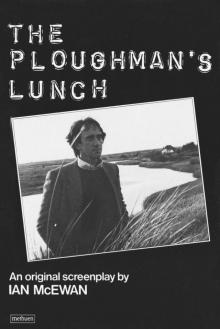 The Ploughman’s Lunch
The Ploughman’s Lunch